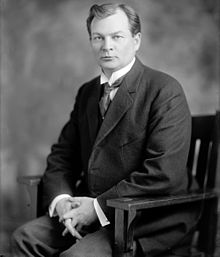Louis Fitzhenry
Louis Fitzhenry (born June 13, 1870 in Bloomington , Illinois , † November 18, 1935 in Normal , Illinois) was an American lawyer and politician . Between 1913 and 1915 he represented the state of Illinois in the US House of Representatives ; later he became a federal judge .
Career
Louis Fitzhenry attended public schools in Bloomington and then worked in journalism. After a subsequent law degree at Illinois Wesleyan University in Bloomington and his admission to the bar in 1897, he began to work in this profession. From 1907 to 1911 he served as the city attorney in Bloomington. At the same time he embarked on a political career as a member of the Democratic Party . In 1910 he ran unsuccessfully for Congress .
In the 1912 congressional elections , Fitzhenry was elected to the US House of Representatives in Washington, DC in the 17th constituency of Illinois , where he succeeded Republican John Allen Sterling on March 4, 1913 , whom he had defeated in the election . Since he lost to Sterling in 1914, he could only serve one term in Congress until March 3, 1915. During this period in 1913 the 16th and 17th amendments were ratified.
After his time in the US House of Representatives, Louis Fitzhenry practiced again as a lawyer in Bloomington. Between 1918 and 1933 he was the successor of the late J. Otis Humphrey at the federal district court for the southern district of Illinois. On June 3, 1933, he was nominated by US President Franklin D. Roosevelt as a judge at the Federal Court of Appeals for the seventh district. After confirmation by the US Senate , he took over from the retired George True Page on June 16 of the same year . He remained in this post until his death on November 18, 1935.
Web links
- Louis Fitzhenry in the Biographical Directory of the United States Congress (English)
- Louis Fitzhenry in the Biographical Directory of Federal Judges
- Louis Fitzhenry in the database of Find a Grave (English)
| personal data | |
|---|---|
| SURNAME | Fitzhenry, Louis |
| BRIEF DESCRIPTION | American lawyer and politician |
| DATE OF BIRTH | June 13, 1870 |
| PLACE OF BIRTH | Bloomington , Illinois |
| DATE OF DEATH | November 18, 1935 |
| Place of death | Normal , Illinois |

